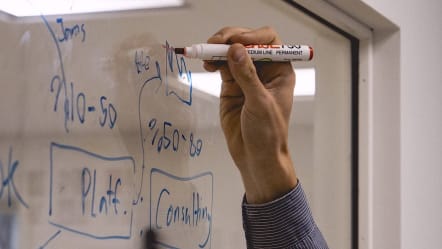Tips for your technical IT job interview

More and more companies use technical interviews or coding tests to check the skills of developers. While careful preparation can boost your confidence, writing code on a white board or answering a series of questions in front of a panel of technical experts remains a nerve-wracking experience. Thankfully, if you've already made it this far in the hiring process, the odds of getting the job are pretty good. The following best practices can calm your nerves and help you navigate that crucial technical interview.
Avoid surprises
Surprises are a fun thing. They can make a birthday party bang, but they can also completely ruin a perfect interview. If you anticipate the interviewer's questions, you can avoid the surprises. At the same time, you can take the opportunity to refresh your skills and knowledge of programs and development methods.
The job description, workspace, and your recruiter are excellent sources for potential topics and technical questions. Your recruiter can probably tell you if you need to set up a server, test code, or do a whiteboard session. You can also find out who you're meeting with and if you're going to have brain teasers or algorithm questions. Glassdoor, kununu, GitHub and current and former employees can provide information on other possible questions.
Repeat your dev knowledge
Once you've made a list of potential questions, fight your fear with knowledge. Study algorithms, certification exams and manuals; take part in an online tutorial or refresh your knowledge of programming languages, data structures and operating systems together with an experienced colleague.
How you arrive at a solution is just as important as your knowledge. Explain your approach; go through your suggested steps with your evaluator and get any questions answered before you start coding. Keep in mind that the recruiter may intentionally omit details and ask vague or ambiguous questions just to see if you start before you have enough information.
Break complex problems into manageable chunks and work on them individually. Show your ability to convey and build coherence by communicating with all participants throughout the interview.
Stay calm
Stuck? Stay calm. Ask for clues. For employers, technical interviews are nothing more than a simulated preview of what it's like to work with you. Provide more examples or ask the interviewer if you can solve a similar problem that requires comparable skills. Answering a question only partially is still better than not saying anything at all.
Nonetheless, if you have absolutely no idea how to solve the problem, admit it. And save the day by explaining what your solution would look like.
Deadlocks
Don't get into heated discussions with the interviewer about solutions, tools, and methods. Even if you think your solution is correct, be open to other ideas and stay calm. If you can't reach an agreement, just acknowledge that you disagree.
Avoid careless mistakes
Don't forget to review and test your code. Or run continuous checks when you need to solve a complicated problem. The interviewer probably won't say it, but he or she expects you to write clean, compact, bug-free code.
Exceed expectations
Exceed interviewers' expectations by showing more than just what you're asked to do. For example: Always give the textbook answer first before offering a shortcut or alternative solution. And always provide examples that support your competence and experience. Otherwise, the interviewer might assume that you've simply memorized the answers to technical questions unless you can back up your code and apparent expertise with practical examples of how you're tackling similar problems.








